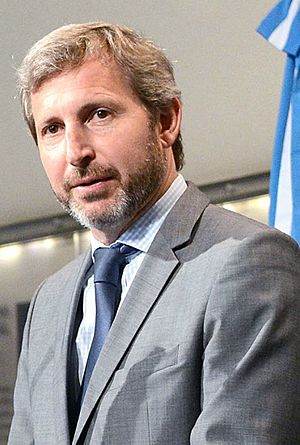Rogelio Frigerio facts for kids
Quick facts for kids
Rogelio Frigerio
|
|
|---|---|
 |
|
| Governor of Entre Ríos | |
| Assumed office 10 December 2023 |
|
| Vice Governor | Alicia Aluani |
| Preceded by | Gustavo Bordet |
| National Deputy | |
| In office 16 December 2021 – 10 December 2023 |
|
| Constituency | Entre Ríos |
| Minister of Interior, Public Works and Housing | |
| In office 10 December 2015 – 10 December 2019 |
|
| President | Mauricio Macri |
| Preceded by | Florencio Randazzo |
| Succeeded by | Eduardo de Pedro (Interior) Gabriel Katopodis (Public Works) María Eugenia Bielsa (Habitat) |
| Personal details | |
| Born | 7 January 1970 Buenos Aires, Argentina |
| Political party | Republican Proposal |
| Other political affiliations |
Cambiemos (2015–present) |
| Alma mater | University of Buenos Aires |
| Signature |  |
Rogelio Frigerio (born on January 7, 1970) is an important Argentine economist and politician. Since December 2023, he has been the Governor of the Entre Ríos Province.
Before becoming Governor, he was the Minister of Interior, Public Works and Housing for President Mauricio Macri from 2015 to 2019. After that, from 2021 to 2023, he served as a National Deputy for Entre Ríos.
Rogelio Frigerio is the grandson of Rogelio Julio Frigerio, who was a very important political figure in Argentina during the 20th century. His grandfather helped start the Integration and Development Movement (MID), and Rogelio Frigerio is also part of this movement today.
Contents
Early Life and Education
Rogelio Frigerio was born in Buenos Aires, Argentina, on January 7, 1970. His father, Octavio Frigerio, was an agricultural engineer and politician. His mother, Sisi Adam, was an expert in body language.
His grandfather, Rogelio Julio Frigerio, was a famous journalist and politician. He was a key person in creating the Intransigent Radical Civic Union (UCRI) and later the Integration and Development Movement (MID). His grandfather also worked as the Secretary of Socio-economic Relations for President Arturo Frondizi from 1958 to 1962. He is known for developing the idea of developmentalism in Argentina, which focuses on growing the country's economy and industries. Like his grandfather, Rogelio Frigerio believes in developmentalism and is a main leader in the Integration and Development Movement.
Rogelio Frigerio finished his high school studies at Goethe Schule. He then earned a degree in Business Administration from the University of Buenos Aires in 1994. He focused on planning and economic development during his studies.
When he was only 15 years old, in 1985, Frigerio decided to get involved in politics by joining the MID. This was an early step in his political career.
Political Career
Rogelio Frigerio started working in the government in 1998, when he was 28 years old. He was appointed Secretary of Economic Programming for a year under Roque Fernández, who was the Minister of Economy during President Carlos Menem's second term.
From 1997 to 1999, he was the president of the Trust Fund for Provincial Development. He also founded a consulting company called Economy & Regions, which he led until 2011.
He is also the president of Federar, a foundation that studies economic and regional development in Argentina.
In 2011, he was elected as a Legislator for the Autonomous City of Buenos Aires as part of the Republican Proposal (PRO) party. In this role, he led the committee that handled the city's budget and finances. In 2013, he became the President of the Bank of the City of Buenos Aires.
When Mauricio Macri was elected President of Argentina in 2015, he chose Rogelio Frigerio to be his Minister of Interior Affairs, Public Works and Housing.
Minister of Interior, Public Works and Housing
As Minister, Rogelio Frigerio helped launch a big plan to improve Argentina's infrastructure. This plan included over 5,800 projects across the country.
Some key achievements during his time as Minister were:
- Connecting more than 800,000 people to clean drinking water.
- Adding 1.5 million people to the sewer system.
- Building and improving many water treatment plants.
- Completing 140 projects to prevent floods, protecting over 1.4 million people and large areas of farmland.
- Improving 100 vulnerable neighborhoods.
- Increasing investment in housing and habitat improvements by 600%.
- Providing over 130,000 home loans.
- Completing 303 projects to improve electrical networks nationwide.
One of the most important projects was the Matanza Riachuelo System. This huge project helped over 4.5 million people living in the Buenos Aires area.
The Ministry also worked to make government processes more open and honest. For example, they started publishing bidding documents for public works online. This helped more companies participate and lowered the costs of projects. They also created a new system called SiGeBe to fairly choose who receives social housing.
Frigerio's Ministry also worked to give more power and resources back to the provinces. They helped create agreements to share resources better, which strengthened federalism. One major achievement was the Fiscal Consensus, which returned 15% of shared tax money to 22 provinces. The national government had kept this money since 1992. This helped many provinces improve their financial situation. By 2018, 18 provinces had extra money, compared to only eight in 2015.
From an institutional point of view, the Ministry worked to increase transparency and fairness in elections. They helped pass important laws like the Law on Access to Public Information and the Law on the financing of political parties. They also promoted changes to make political representation more democratic.
Personal Life
Rogelio Frigerio is married to Victoria Costoya, who is a lawyer. They have two children together, named Máximo and Delfina.
See also
 In Spanish: Rogelio Frigerio (nieto) para niños
In Spanish: Rogelio Frigerio (nieto) para niños

